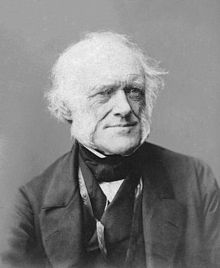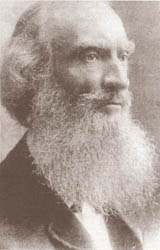Sir Daniel Wilson
Lyell, Charles
Charles Lyell (1797-1875) was British lawyer and the leading geologist of his day. He  was a enthusiastic proponent of uniformitarianism as expressed in his best known book, Principles of Geology. Daniel Wilson quoted Lyell as concluding that “the entire evidence is adverse to the idea that the Canaries, the Madeiras, and the Azores, are surviving fragments of a vast submerged island, or continuous area of the adjacent continent.” From the same book, R.E. Anderson quotes[1486] Lyell as confessing a temptation to ”accept the theory of an Atlantis island in the northern Atlantic” [1472.141].
was a enthusiastic proponent of uniformitarianism as expressed in his best known book, Principles of Geology. Daniel Wilson quoted Lyell as concluding that “the entire evidence is adverse to the idea that the Canaries, the Madeiras, and the Azores, are surviving fragments of a vast submerged island, or continuous area of the adjacent continent.” From the same book, R.E. Anderson quotes[1486] Lyell as confessing a temptation to ”accept the theory of an Atlantis island in the northern Atlantic” [1472.141].
This view was contradicted by later geologists in the 19th and early 20th centuries, who even suggested landbridges across the Atlantic or a series of islands offering stepping-stones between the Old World and the Americas. Today, supporters of an Atlantic Atlantis offer less dramatic theories suggesting, the Canaries, Azores or Madeiras are remnants of Plato’s Island.
Wilson, Sir Daniel
Sir Daniel Wilson (1816-1892) was a former president of the University of Toronto. He produced  a book[584] at the end of the 19th century that investigated the origins of the Native American peoples. He seems to have been convinced that there were frequent contacts between the Old World and the Americas, as far back as the time of the Phoenicians, and that these contacts brought news of America back to Europe, providing some of the basis for Plato’s description of Atlantis.
a book[584] at the end of the 19th century that investigated the origins of the Native American peoples. He seems to have been convinced that there were frequent contacts between the Old World and the Americas, as far back as the time of the Phoenicians, and that these contacts brought news of America back to Europe, providing some of the basis for Plato’s description of Atlantis.
His book can be read(a) or downloaded(b) online.
(a) https://www.canadiana.org/ECO/mtq?doc=41556
(b) https://archive.org/details/lostatlantisothe00sird
